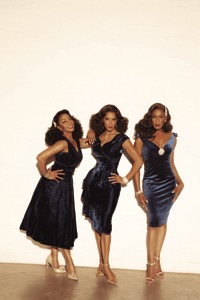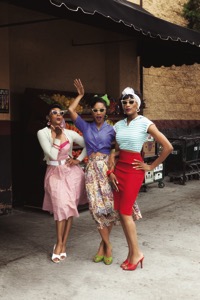
Thom Senzee, author of this article, is a West Coast-based freelance journalist, and a regular contributor to San Diego LGBT Weekly.
At a notably young 53, Terry Ellis, founding member of En Vogue, is perhaps more energized for hers and her bandmates’ upcoming appearance in the headliner slot at 2017’s San Diego LGBT Pride Music Festival than any previous act to be booked as the event’s lead-performers in years – maybe ever.
“Oh my gosh, that energy has always been there for us,” Ellis said during a recent phone interview. “Pride shows are among our favorite because that energy is what drives us. We love giving it back.”
Famous for a slew of 1990s R&B, dance-pop and crossover-genre hits ranging from “Hold On,” and “My Lovin’ (You’re Never Gonna Get It)” to “Whatta Man” as well as their 2017 singles “Deja Vu” and “I’m Good,” En Vogue will make the Main Stage at this year’s San Diego Pride festival a spot that rocks with high energy, yet beckons with familiarity.
Ellis told San Diego LGBT Weekly that if there were any more energy flowing between En Vogue and its fanbase within the LGBTQ community, “… we’d all probably fly right off the planet.”
Currently touring under the intersectional moniker, “Three Stripes Tour” along with SWV another legacy act, Bel Biv DeVoe, which is comprised of former members of New Edition, while sweetening the edges on their forthcoming Electric Cafe album due out this summer, En Vogue’s relevance persists on both the music and societal fronts.
That’s especially true, says Ellis, when it comes to America’s year-long retrogression into what some, this reporter not least among them, might call trumpism and all that comes with it.
“It is a systemic issue that’s been around for…we know how long,” Ellis said, replying to a question about the shocking acquittals of police officers charged with murdering black men in recent weeks, as well as the general atmosphere of backlash that has prevailed in the post-2016 era – a backlash against progressive, pro-diversity politics.
“I do believe and feel that it has escalated,” she said. “And as musicians through our music, we’re in a position where we are blessed to stand on a platform where we can communicate; and so it’s always been important to us to have something of substance to say.”

People – and musicians are no exception – can become stale in our outlooks about the prospects for humanity’s betterment as we age. Perspectives can harden as we see reasons to let hope for a better tomorrow fade. To those who dared wonder if the election of this nation’s first black president eight-and-a-half years ago might usher in a new era and a “post-racial” America, but who now see bitterness and division defining political discourse, Ellis insists hope lives on.
Pride and Enduring Hope
“There’s always hope,” Ellis said during our pre-San Diego Pride interview. “That’s kind of what Pride is about too, I believe.”
According to her, whether musician, housepainter or elected official, everyone and anyone who believes in, or who once believed in, the prospect for a brighter, more unified American society has a part to play in manifesting freedom and equality now more than ever.
“We do what we can through our music and that’s why ‘Free Your Mind’ is so important,” Ellis said. “Look, we wrote that song in 1992; and here we are and the message is still as important today as it was back then – even more so now. That’s why we’re so honored and proud to be able to stand on the Pride stage and be able to deliver that message.”
But don’t let Ellis’ optimism and insistence that hope lives on make you think she’s oblivious to the current surge in homophobia, transphobia and white nationalism that came with the arrival of Donald J. Trump in the Oval Office.
While this interviewer detects in the artist an almost old-fashioned respect for the notion that it’s discourteous to discuss politics or religion in polite company, Ellis nevertheless acknowledges there’s a clear and present threat to the hard-fought modicum of progress toward equality for racially, economically, sexually and gender-diverse communities won in recent years.
“It’s a huge problem and a huge issue,” Ellis said. “But if we can touch someone through our music and jar someone’s mindset with that song [‘Free Your Mind’] through our music that’s important to us, well that’s definitely the platform we stand on, especially being African American.”

She and her En Vogue bandmates now share presences in the Smithsonian Institution’s National Museum of African American History and Culture, the National Museum of American History as well as the Rock and Roll Hall of Fame (the only artists to hold distinct recognition within all three of those honored walls).
In addition, they have sold more than 22 million copies of their music since they exploded onto video screens and out of audio speakers circa 1990.
Today, the fashion-music fusion group boasts a recently released, Raphael Saadiq-produced single, “I’m Good.” That instant R&B classic’s lyrics combine with piercing, on-point harmonies – what else would you expect from these indisputable masters of harmony – to deliver a confident, though not cocky, personal anthem of self-affirming, mid-life joyfulness that’s easily adopted by listeners who’ve known En Vogue since the decade they all but owned, and by new fans alike.
“Music really is a universal language,” Ellis said. “It sounds like a cliché, but it really is the truth. We want to be able to connect, and to connect in a positive way. Our objective at Pride will be to uplift. That’s what we hope to do.”
Asked about their secret behind maintaining En Vogue’s legendary high-fashion esthetic, not to mention hers and her fellow band members’ apparently invulnerable appearances of youthful beauty, Terry Ellis reverted to near-girlish shyness during our interview, at least initially.
Ultimately, however, she offered a purely professional explanation:
“Well, thank you,” Ellis said, bursting into spontaneous and intermittent laughter. “Well, first thank you again. I think we never really look at ourselves that way. The only thing we can contribute it to is our purpose and being fortunate enough to be in a position to perform. We have a responsibility; and it’s important to us to live up to that standard. That means getting enough rest, drinking a lot of water, eating as healthy as possible – but that’s not to say we don’t venture out of the box, because I love sweets! But I’m very selective about that.”
Sweets notwithstanding, self-discipline is a watchword for Ellis and company.

“Our show is so high-energy that if we’re going to give 100 percent, we have to watch how we take care of ourselves.”
“We are so grateful to be able to continue to do what we’ve been doing. It’s been 27 years now. We still love walking out on stage and sharing our energy and connecting and just partying.”
Ellis also expressed gratitude and humility about her recent opportunity to work with producers Raphael Saadiq, Foster & McElroy and Dem Jointz on En Vogue’s new, forthcoming album. Likewise, she said she almost can’t believe the trifecta of storied museums into which she and her bandmates have been inducted.
“It’s so surreal and I’m not sure we’ve really processed it,” she told LGBT Weekly. “We do not take this for granted, any of it.”











